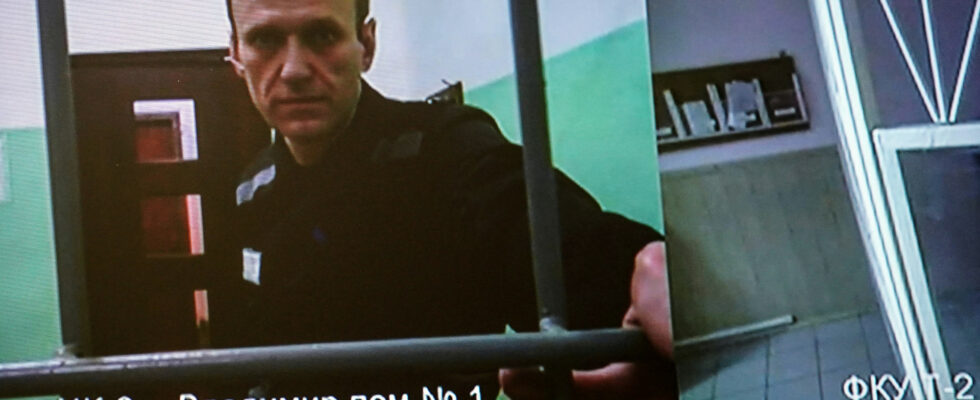Romain Rouillard / Photo credit: TATYANA MAKEYEVA / AFP
Detained since January 2021, Alexeï Navalny “left” the IK-6 penal colony, where he was imprisoned, according to his spokesperson Kira Yarmysh. But to go where? A question to which it is very difficult, at this stage, to provide an answer. For the simple reason that the main opponent of Vladimir Putin, sentenced to 19 years in prison for extremism, has not given the slightest news for a week.
Alexei Navalny was to be transferred to a “special regime” penal colony, where prisoners undergo the harshest conditions of detention in the Russian prison system. Reaching these establishments, often located in very remote regions, takes some time, but this total lack of communication around his case raises questions and worries. The White House, through John Kirby, spokesperson for the National Security Council, said it was “very concerned” about the situation, provoking the wrath of Moscow which denounced this Tuesday the “unacceptable” interference of Washington.
Судя по всему, Алексея Навального нет во Владимирской области (с попра вкой на то, что верить ФСИН на слово безоговорочно не стоит).
And it’s a sign that it’s on the right side.
This is the next step — it’s the next step.
Разумеется, то, что это происходит именно сейчас…— Leonid Volkov (@leonidvolkov) December 11, 2023
“A whole series of restrictions were imposed on him”
The European Union, for its part, reiterated its demand for the “immediate” release of the Russian opponent. “Russian political leaders are responsible for his health and safety in prison and will be held accountable,” added on X (ex-Twitter), Josep Borrell, head of European diplomacy. Because it is the physical condition of Alexeï Navalny which crystallizes the fears. “There have already been worrying details and signals about Navalny for several months. In particular about his state of health, for which he did not receive treatment. He had not had a medical examination either,” underlines Carole Grimaud, geopolitical analyst and Russia specialist.
Highly worrying news of @Navalny missing for 7 days. Russia’s political leadership is responsible for its safety & health in prison for which they will be held to account
The EU reiterates its call for its immediate & unconditional release from
politically motivated incarceration— Josep Borrell Fontelles (@JosepBorrellF) December 12, 2023
So many fundamental rights which have gradually been confiscated from him. “Then, his lawyers were not able to see him for a few days. The same thing for his loved ones. There were a whole series of restrictions imposed on him to cut him off, little by little, from the outside world,” adds the researcher. A tightening of detention conditions, to be compared with the announcement of Vladimir Putin’s candidacy for the presidential election of March 17. The master of the Kremlin will seek a fifth term there.
However, even in this pre-electoral context, such relentlessness is surprising given that Alexeï Navalny is already behind bars. According to Carole Grimaud, the opponent’s imprisonment did not necessarily hinder his influence. “Even when he was in detention, he was still active and continued, through those close to him, to be present on the networks. He communicated with his sympathizers and continued to benefit from weight and a voice in Russia “. In doing so, the risk of “heroization of Navalny within the Russian population” is taken very seriously by Vladimir Putin, assures Carole Grimaud. Hence the need for the Kremlin to permanently silence him, “to physically erase him”, so that no reference to Alexeï Navalny is possible for the opposition and he is no longer part of the landscape. politics of the country.
“Victim of enforced disappearance”
However, assures Carole Grimaud, establishing proof of the direct involvement of the Kremlin, in the event that a tragedy occurs around Alexeï Navalny, will not be obvious. The researcher uses as proof thepoisoning of the Russian opponent in August 2020. Three years ago, Navalny was plunged into a coma, then on respiratory assistance after feeling unwell during his arrival at Moscow airport. Samples taken in Germany, where he was transferred, had, according to Berlin, revealed the presence, in Navalny’s body, of novichok, a powerful neurotoxicant developed by the USSR for military purposes. “We suspect that it was a coup by the Russian secret services. There had been elements but, in no case, the direct responsibility of Vladimir Putin,” concludes Carole Grimaud.
An opacity which does not bode well for the future, and even the present, of Alexeï Navalny. According to Denis Krivosheev, deputy director of Amnesty International’s Eastern Europe and Central Asia programme, the opponent can even be considered “as a victim of enforced disappearance”. “The Kremlin will stop at nothing to crush its detractors,” he added in a statement.
